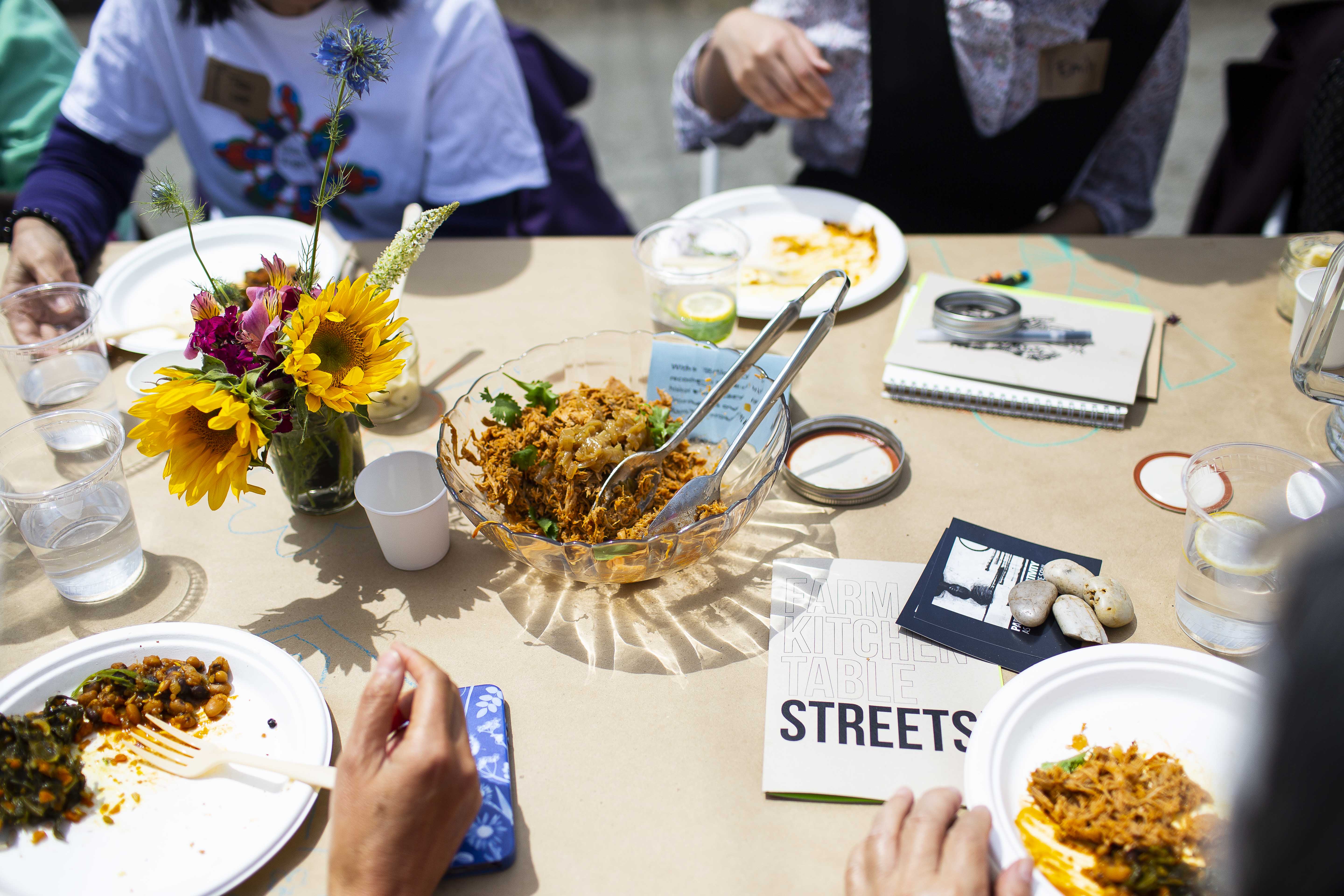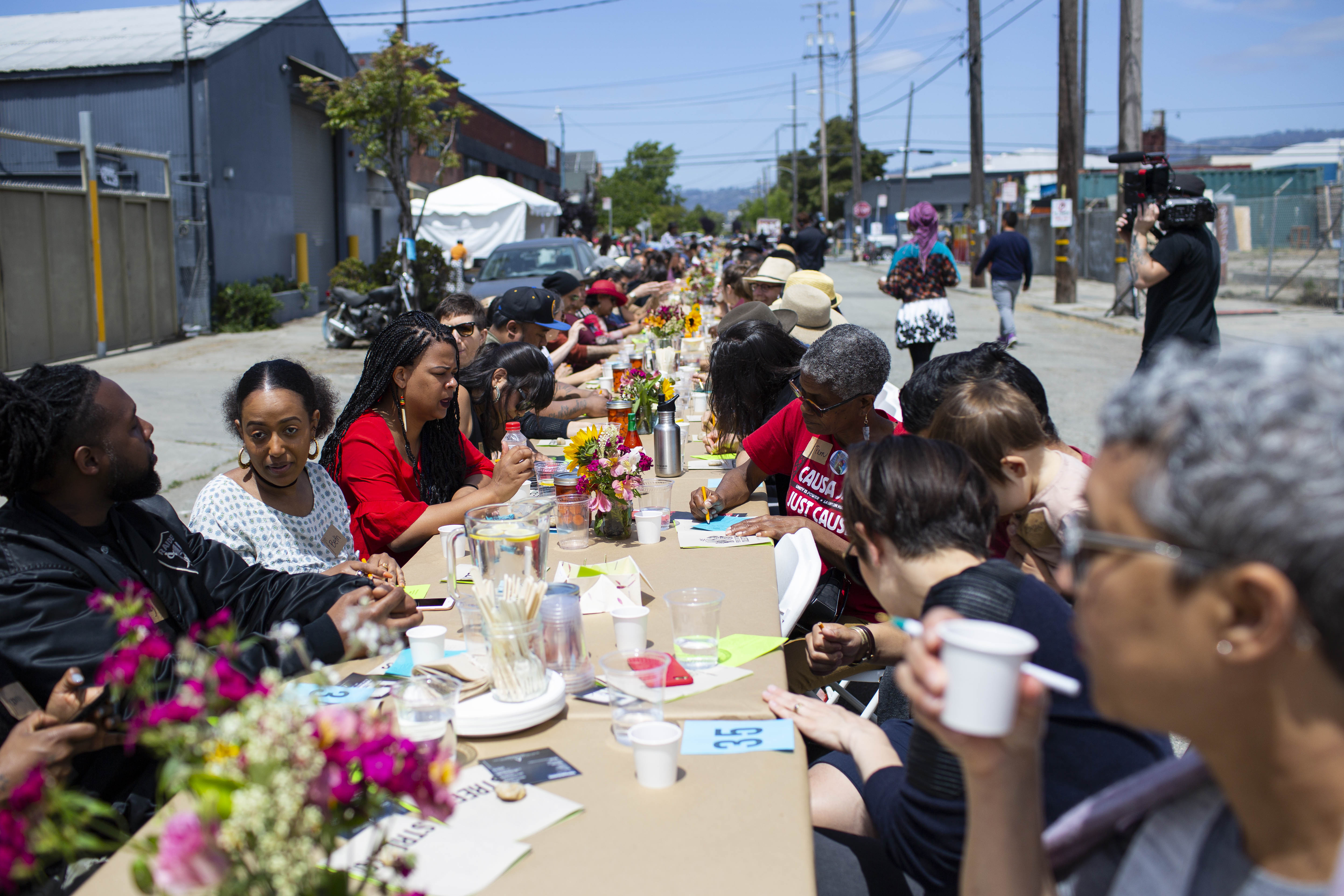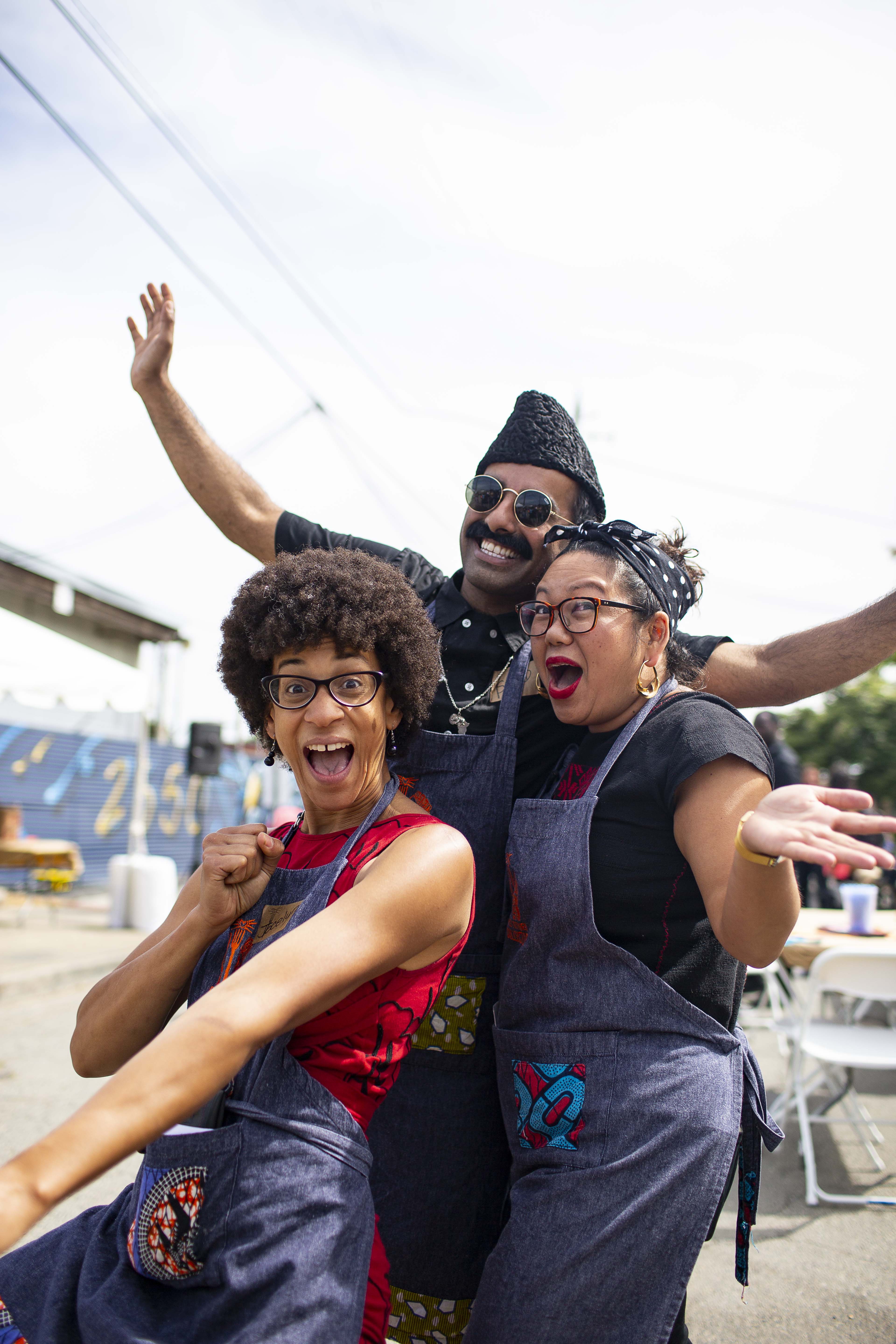
On a Sunday afternoon in Oakland, California, a table—which is really a series of folding tables placed end-to-end—stretches down the middle of the street. Covered in brown craft paper and decorated with small mason jars serving as vases for flowers, the tables take up an entire city block on Magnolia Street, from 26th Street to 28th Street.
People of various ages and races settle into chairs at the tables, and the meal begins with a musical invocation. “I love you. I need you to survive,” sings Jocelyn Jackson, co-founder of the People’s Kitchen Collective, the group that planned this improbable sit-down meal in the streets for 500 people.
The People’s Kitchen Collective describes its mission as “political education through art, activism, and food.” Founded by Saqib Keval, Sita Kuratomi Bhaumik, and Jackson, who don matching denim aprons for their events, the group creates meals that celebrate communities of color—and builds solidarity between them.
“These community meals are curated on a theme that really reaches out to people and brings them into an experience that feels powerful, joyful, and celebratory, but also acknowledges the lived experiences of black and brown folks, their struggle, and their survival,” Jackson says. Today’s meal is the culmination of a four-part series, “From the Farm to the Kitchen to the Table to the Streets!”

(Photo: Brooke Anderson)
The group began when Keval, who has worked in restaurants for 16 years in various capacities as a chef, in the front of house, and as a manager and consultant, grew frustrated that the food he prepared was not accessible to everyone. “You spend all this time putting all this care and attention into this food, but it’s for such a small segment of the community, and the people who are eating it do not reflect me or my community,” he says. (These days, Keval co-owns his own restaurant, Masala y Maiz, which opened in October of 2017 in Mexico City.)
As an alternative, Keval started the People’s Kitchen Collective in 2007 with a rotating crew of volunteers and collaborators. In 2015, he asked Bhaumik and Jackson to join him and form an “unapologetically political” food project. Food, all three of them agreed, tells the stories of a community’s journey.
“Recipes will tell you about resistance movements, migration, enslavement, all of these types of factors that push and pull a people and introduce them to different ingredients—or forced different ingredients—into their diet,” Keval says. Keval himself hails from a large immigrant family that migrated from India to East Africa to the United States over the course of 250 years.
The dishes for each meal are carefully researched, and every element is imbued with meaning. The meal on Magnolia Street begins with a tasting of teas—artemisia, yerba buena, and rose hip—gathered by two Ohlone restaurateurs known as Mak-‘amham (“Our Food”), whose ancestors were indigenous to this area of California. Volunteers serve spring garden salad, cornbread, collard greens, black beans, and pulled chicken with barbecue sauce. The menu today is a tribute to the Great Migration, which brought black families from the South to this very neighborhood, West Oakland. A mix of industrial and residential buildings, it is home to a primarily African-American population, though those demographics are currently changing due to gentrification.

(Photo: Sana Javeri Kadri)
During the meal, youth from Young Gifted and Black perform choral poems about black history. “These are our songs, written for black children to sing, elegies of forgotten pasts,” the group recites in unison. For dessert, almond cake, made with spices from the global South, celebrates the friendship of Malcolm X and activist Yuri Kochiyama. Kochiyama was incarcerated with her family in internment camps during World War II, an experience that led her to advocate on behalf of political prisoners. The cakes are intentionally served whole so that people at each table must cut and share slices as a family would.
The date of the meal, May 20th, 2018, is just one day after the shared birthday of Malcolm X and Kochiyama, and members of the Kochiyama family are in attendance. Even the location holds significance: 28th Street was where Oakland police shot Bobby Hutton of the Black Panthers to death.
The collective draws inspiration from the Black Panthers, who recognized in the 1960s that a lack of access to nutritious food was a major urban inequity. The group’s Free Breakfast for School Children Program began at a church in Oakland and spread to other cities, feeding thousands of children daily.
“I think the Free Breakfast Program for School Children is perhaps one of the most revolutionary and lasting things that the Panthers did,” Keval says. “As people of color, eating together can be a revolutionary act, especially when you’re claiming space publicly in the face of generations of oppression that have put so much work into making sure that you can’t do that—that you can’t gather.”
The People’s Kitchen Collective carries on the tradition with free meals, funded by donations and grants. Each fall, it serves free breakfast at the Life Is Living Festival held in DeFremery Park, known unofficially as Bobby Hutton Park. Today, on Magnolia Street, the collective feeds 500 guests from community groups and the neighborhood and 100-plus volunteers.
As the meal ends and guests move away from the tables, a DJ turns up the volume and people start dancing in the streets. People take home the jars of flowers, free plants, and brightly colored posters that read, “The remedies are in our kitchens.” Under the tent where the food was served, volunteers pack up food in compostable to-go containers, ready to distribute 100 meals to people living nearby on the streets.




